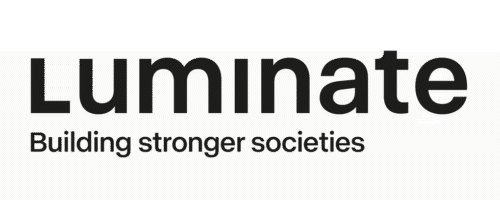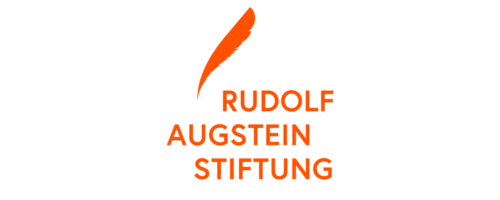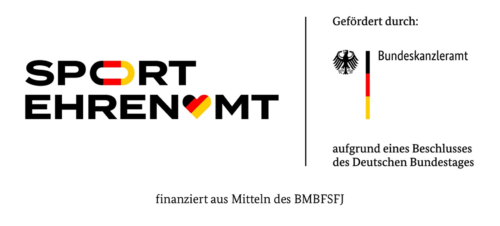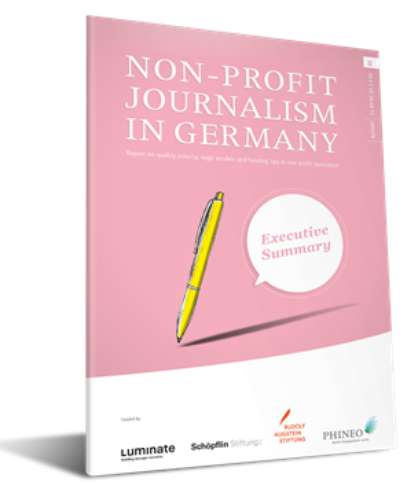Non-profit journalism in Germany
Journalism has the function of orienting and educating the public in a democracy. But journalism in Germany is facing a crisis in the era of digital transformation. The Report Non-profit journalism in Germany offers decision-makers and funders an introduction to the field.
The publication of this report falls in the midst of the corona pandemic, which has created a paradox for journalism. Reliable information is needed now more than ever.
At the same time, media outlets are losing key sources of income that they normally receive through advertising and events. Many journalists live in fear of losing their livelihood as entire media outlets face bankruptcy, particularly within the local media landscape. While this era demonstrates the urgent need for journalism, it has also exposed the fragile nature of journalism’s economic foundation. We are witnessing a market failure.
The corona pandemic is exacerbating an already precarious situation. For years now, the world of journalism has been struggling with a number of crises. While digitalization demands constant innovation from editorial offices, digital business models themselves have proved only marginally viable. Journalism is struggling to maintain its capacity to stimulate and shape public debate in society.
One thing is for sure: When journalism is no longer able to make complex problems transparent, democracy begins to falter. Social cohesion and civil society engagement suffer while mismanagement and corruption increase.
Driven by the need to counter these developments, the Non-Profit Journalism in Germany report focuses on what’s new. It tells the story of an awakening, of how the crisis-weary world of journalism has embraced a pioneering spirit. Adding to the traditional pillars of private and public services, pioneers in the field are building a third pillar within the media landscape: non-profit journalism.
This mode of journalism has a new operating model that is free from commercial interests, and is innovative, solution-focused and collaborative. Non-profit journalism seeks to establish a close rapport with its users and strengthens media diversity in the digital age. In order to achieve this, it needs the support of people.
The report addresses those who are needed to help establish non-profit journalism and increase its potential – from courageous financiers to political advocates. The report offers these target groups recommendations for actions they can take.
Non-profit journalism: Important impulses
The group of non-profit journalism organisations featured in this report can contribute to this goal. There are at least three ways in which they strengthen the field of journalism and society at large:
- Non-profit journalism tends to strengthen the diversity of opinions and thereby democracy as a whole.
- Non-profit journalism is often highly innovative, both in terms of its new business and financing models and the new approaches and practices to journalism.
- For non-profit journalism, cultivating community-oriented journalism with active participation of citizens is embedded in their culture and approach.
The 20 non-profit actors presented in this report – 15 of which are in Germany and the remaining five in the United States, England and Switzerland – are inspiring examples of the diversity, innovative power and constructive approach that characterizes non-profit journalism.
Project partners




Non-profit journalism: How funders can help
- Help change the funding landscape for non-profit journalism: In Germany, less than one percent of all foundations currently support journalistic services. In order to establish non-profit journalism as the third pillar in the sector (besides private publishers and public broadcasters), we need more funders and advocates to be able to generate more financial resources. This might involve, for example, making venture capital available for innovation and testing new financing ideas, such as joint start-up funds for journalism start-ups in which several funders can participate.
- Support sustainable structures: As important as individual project funding is, it is just as crucial to provide systematic and lasting support for the field and its actors. This includes, for example, establishing institutional support for proven approaches that ensure infrastructure and personnel – or investing in larger platform solutions along the lines of a publicprivate partnership.
- Provide support where it’s needed: The more strongly your commitment targets real existing needs, the greater your impact. Structural funding and long-term commitments enable higher impact and sustainable development.
- Emphasize impact: Your engagement will have a social impact only if you can identify beforehand what will improve or be different afterwards. It is therefore important to plan and implement your engagement with care, sufficient flexibility and support for capturing impact.
Non-profit journalism: Trends
The report concludes by taking a look at three major trends that will shape the field of journalism in the coming years.
- Interconnectedness is steadily growing: This is taking place on three levels: among journalists, between journalists and their community, and between actors from the for-profit and non-profit sectors (through specific types of cooperation).
- The spectrum of approaches continues to expand and is diversifying: Journalists are working more closely together than ever before. As part of a community, readers are not only helping finance and obtain information, they are also contributing to the interpretation of information and forming of opinions, thereby themselves driving topics and services. In addition, we see an increase in cooperation between actors from the for-profit, non-profit and public media.
- The search for suitable forms of financing will provide the sector with a variety of forprofit, non-profit and hybrid business models. There is already a variety of financing models among non-profit actors that combine established with new sources of income.
The report is free of charge and is available under CC license. It was created in cooperation between Luminate, Schöpflin Stiftung, Rudolf Augstein Stiftung and PHINEO.
Do you have any questions?
Charlotte Buttkus


